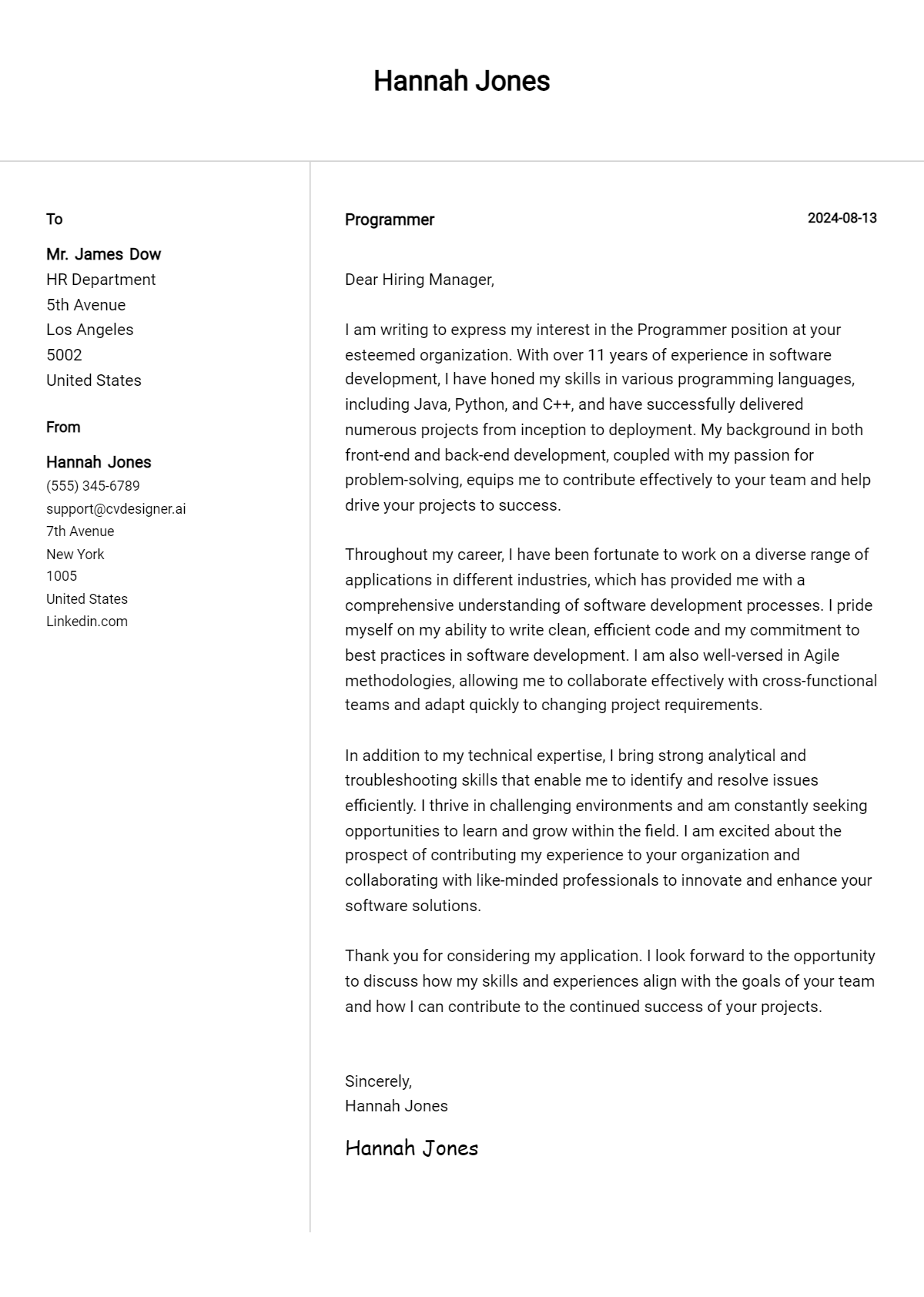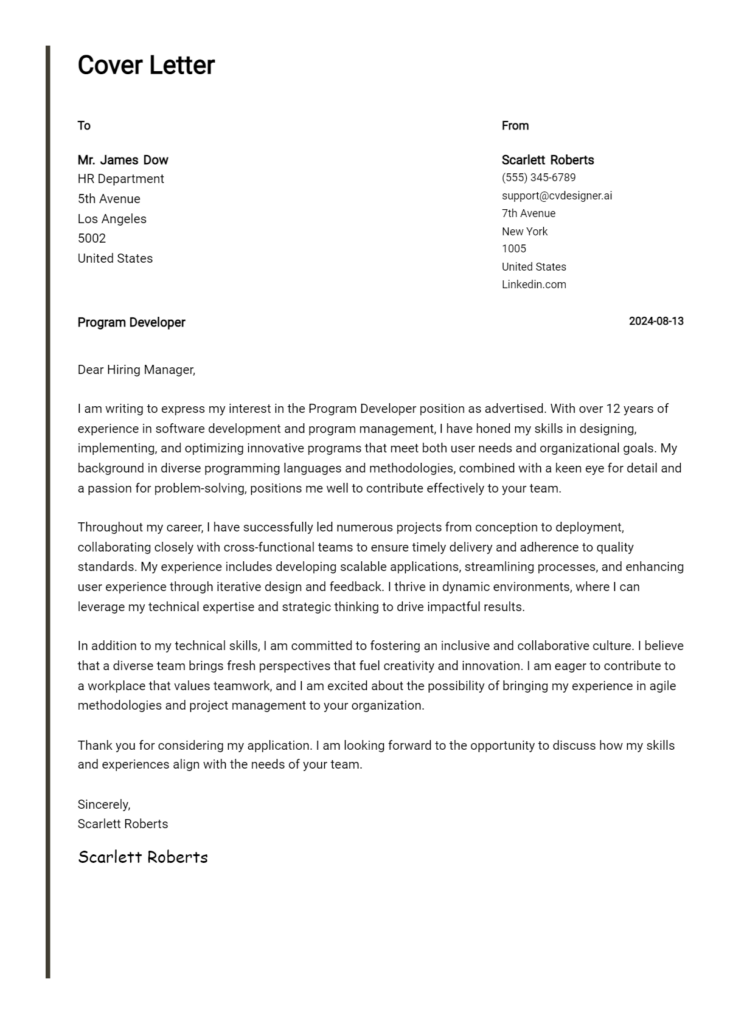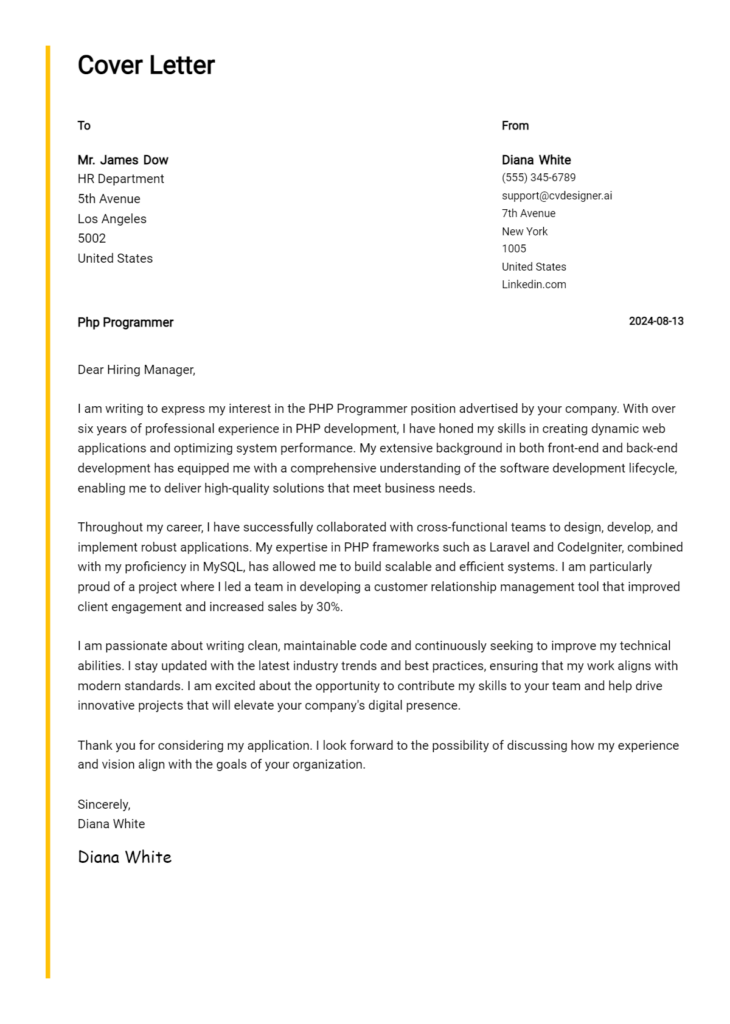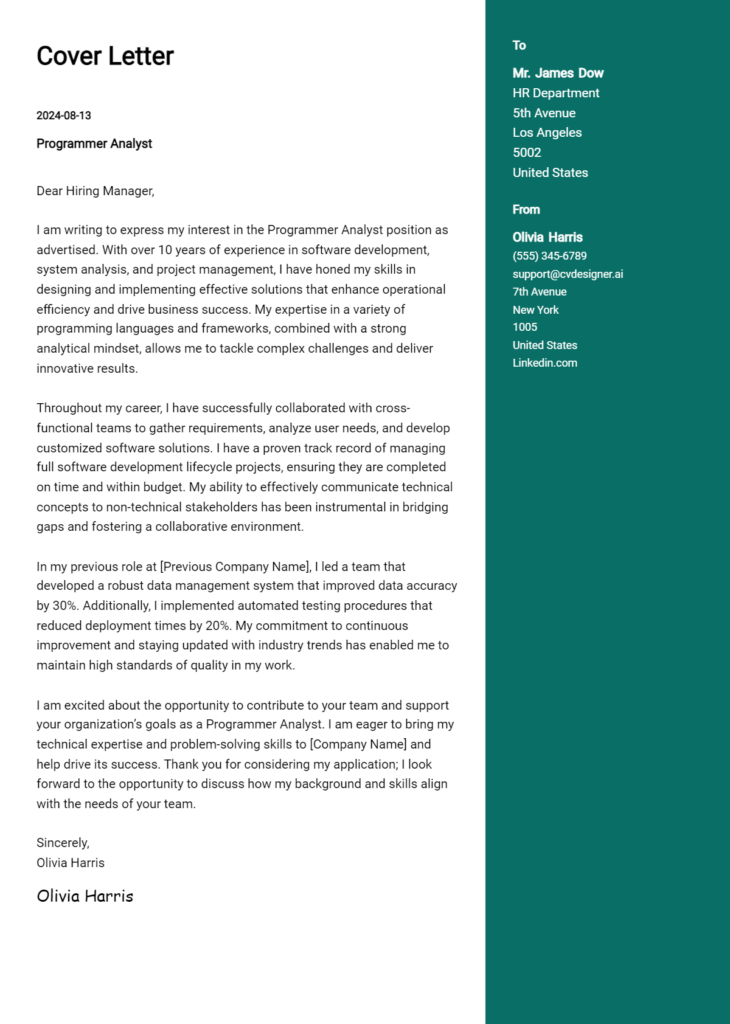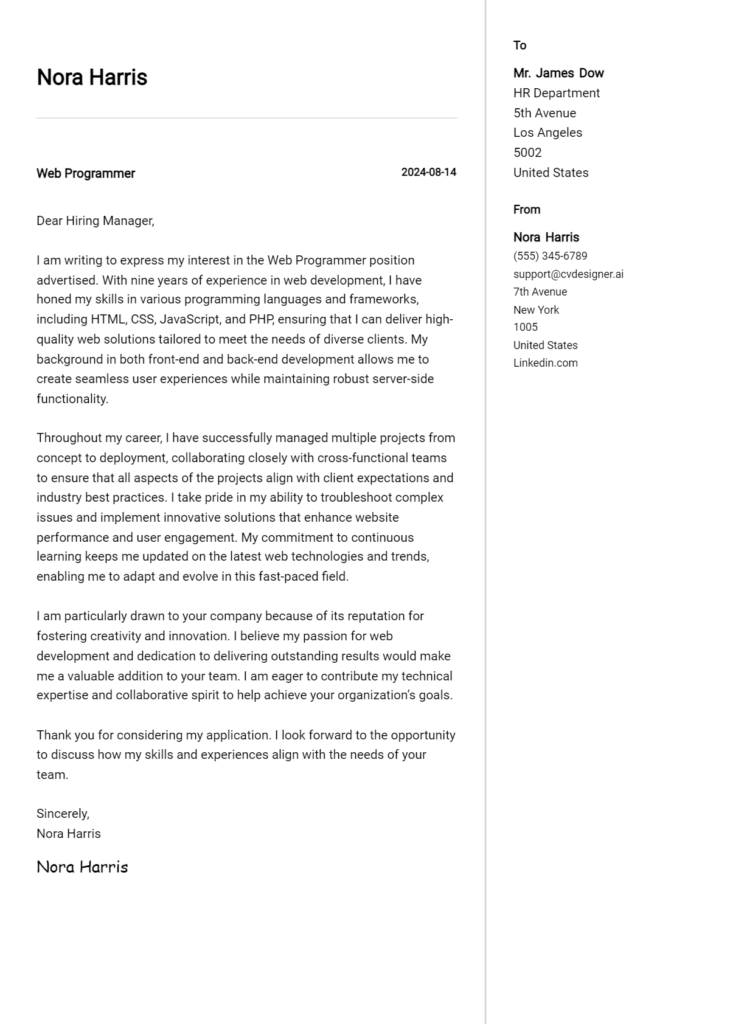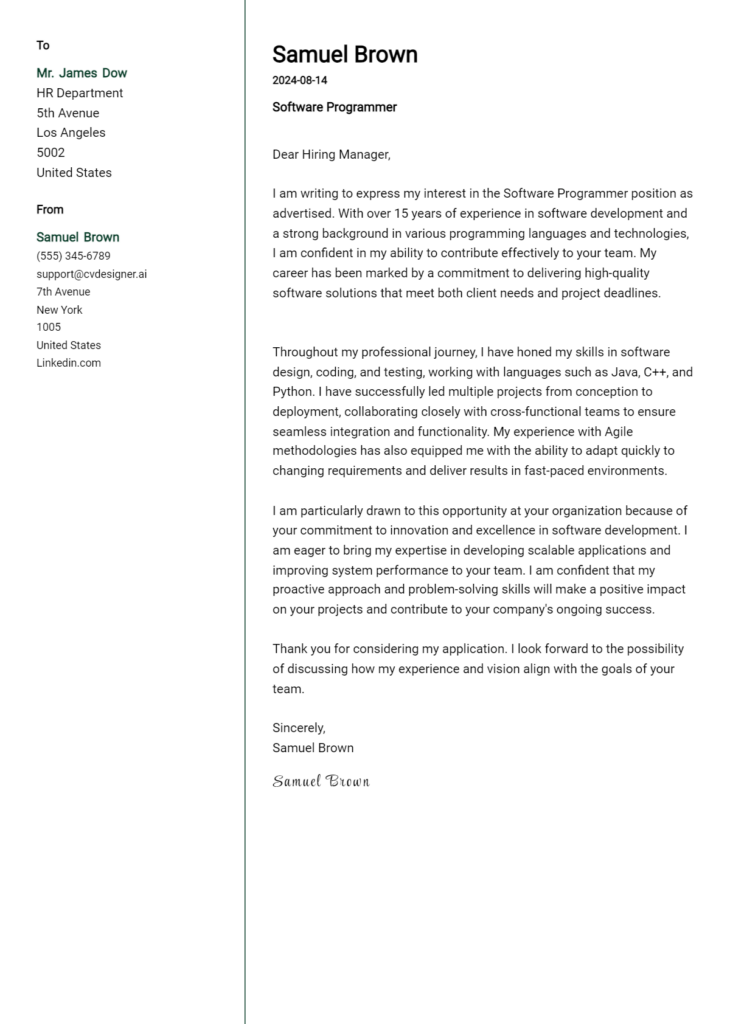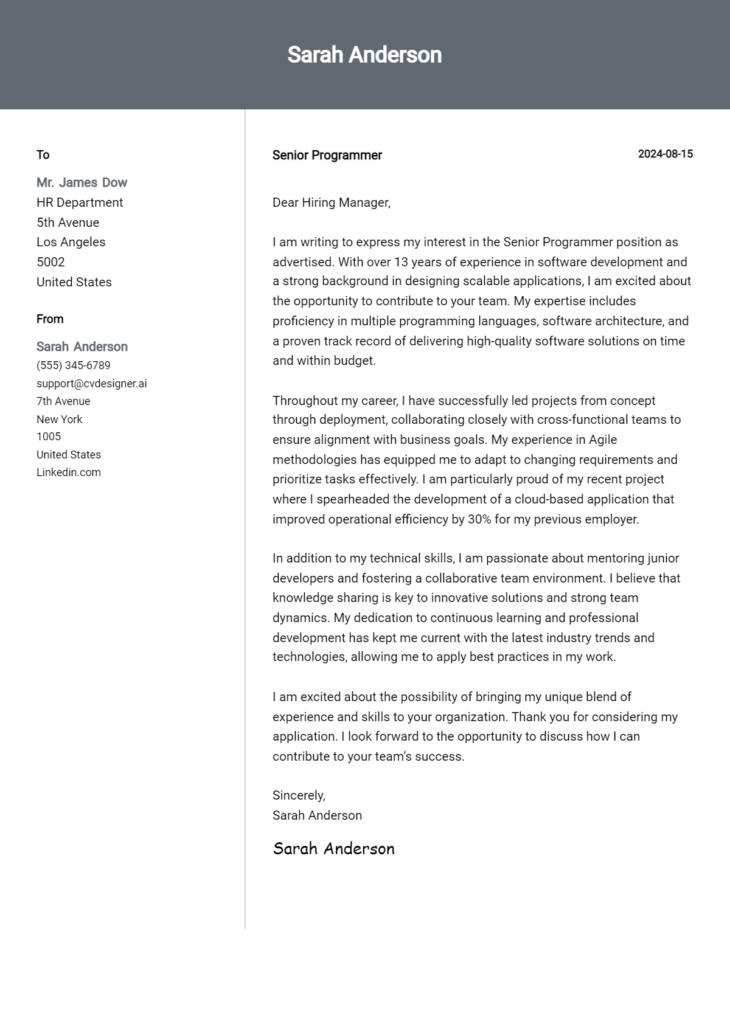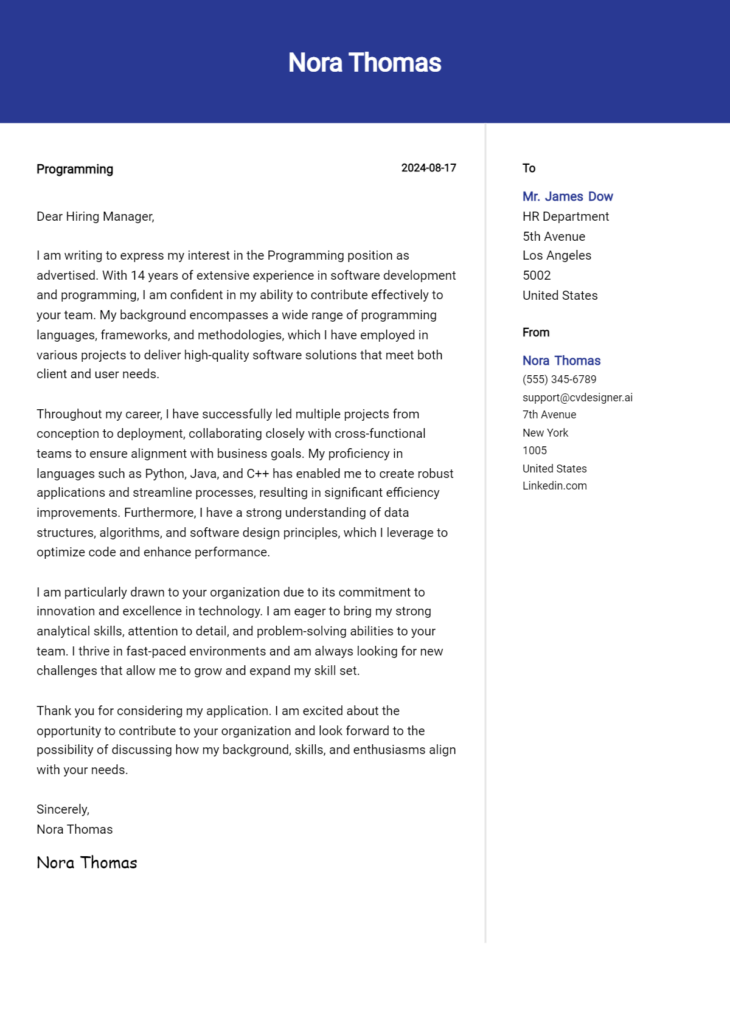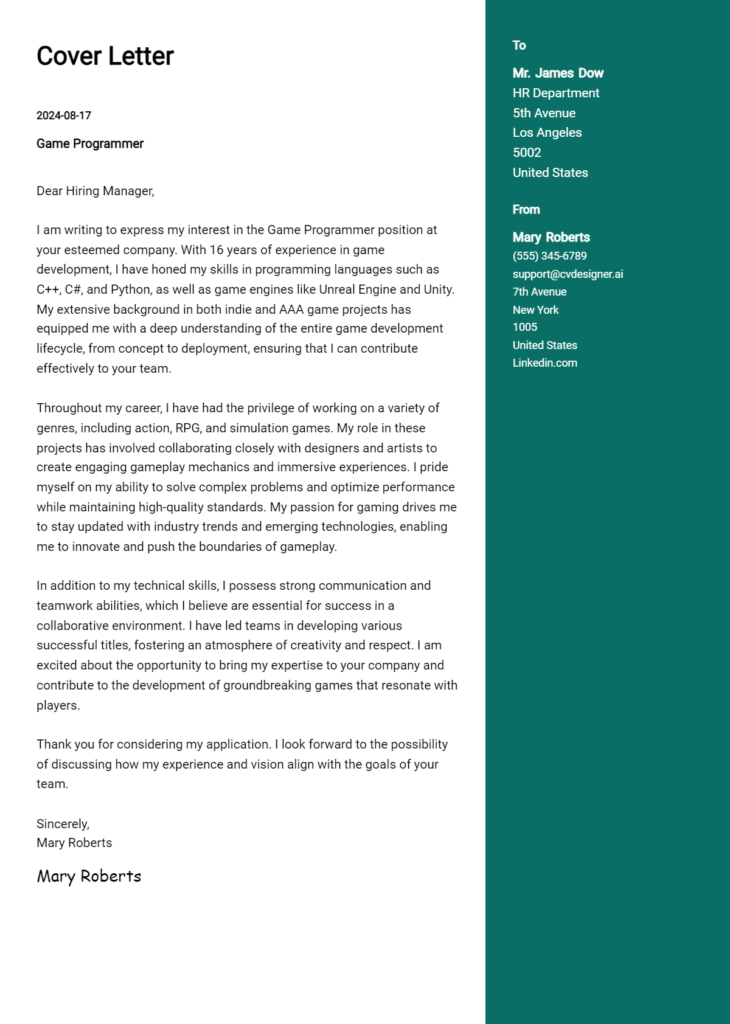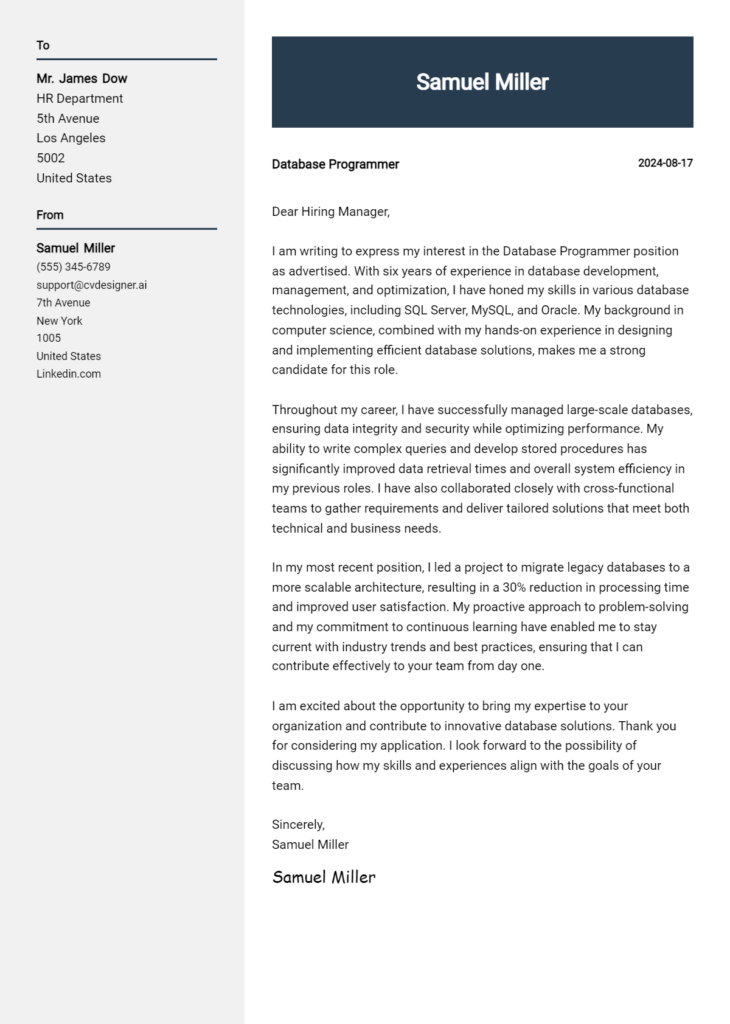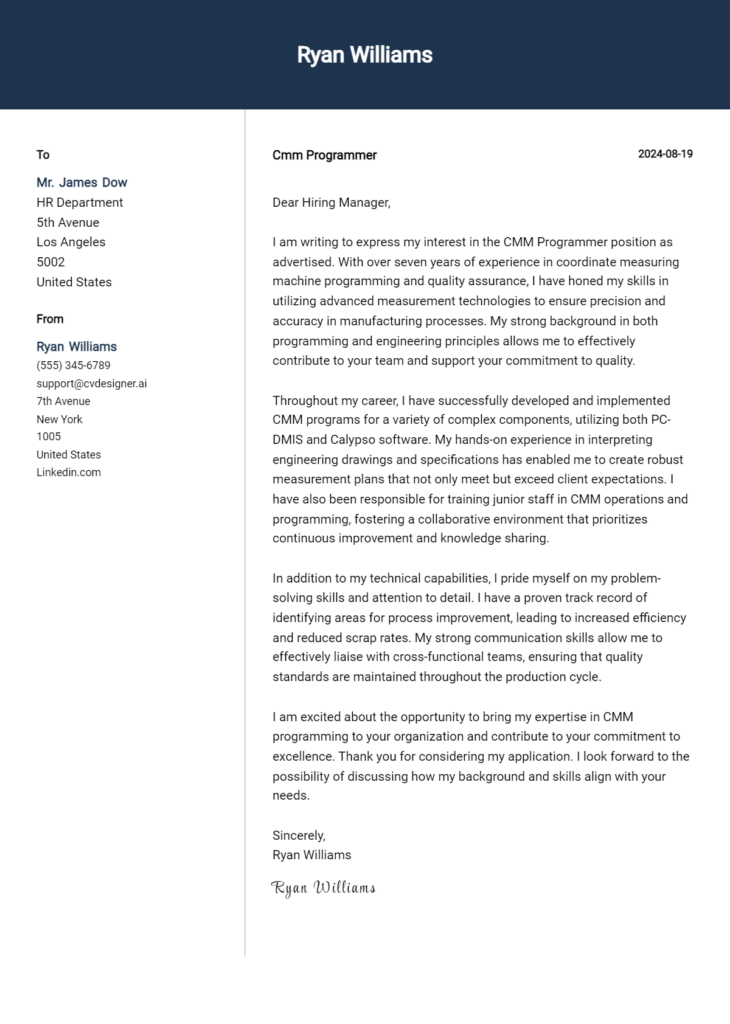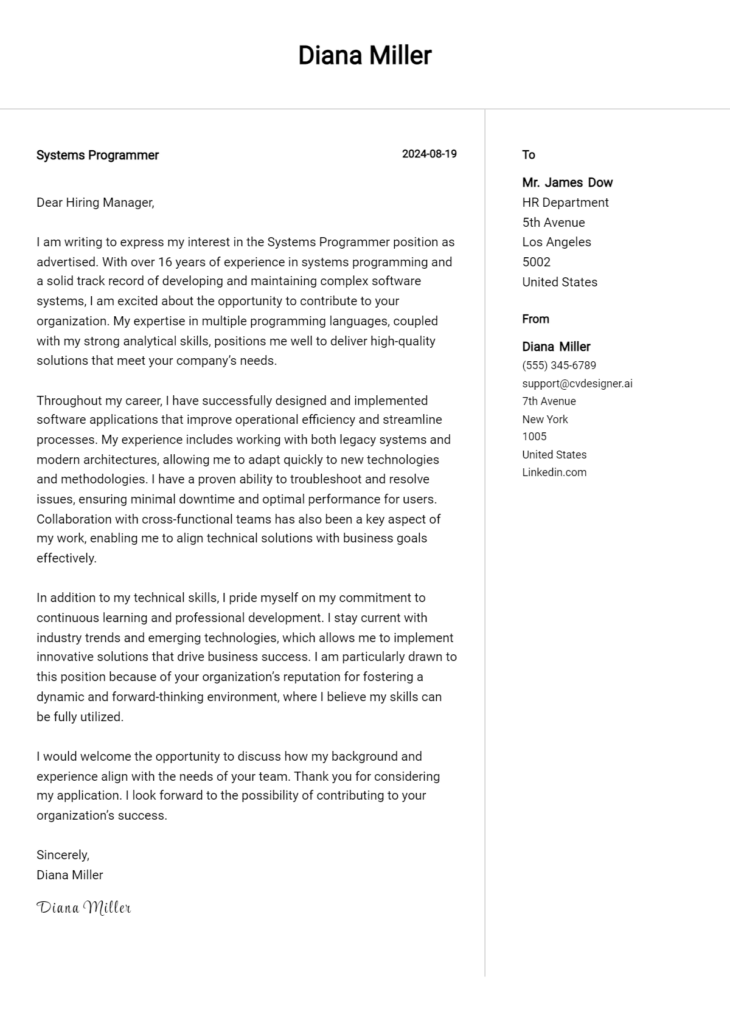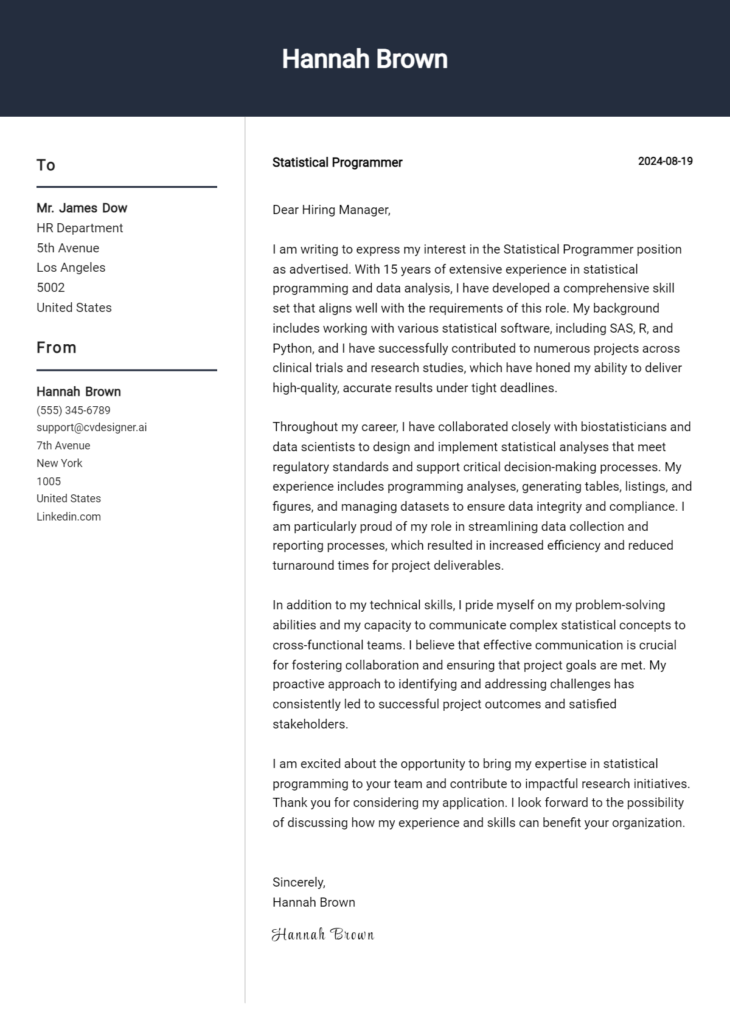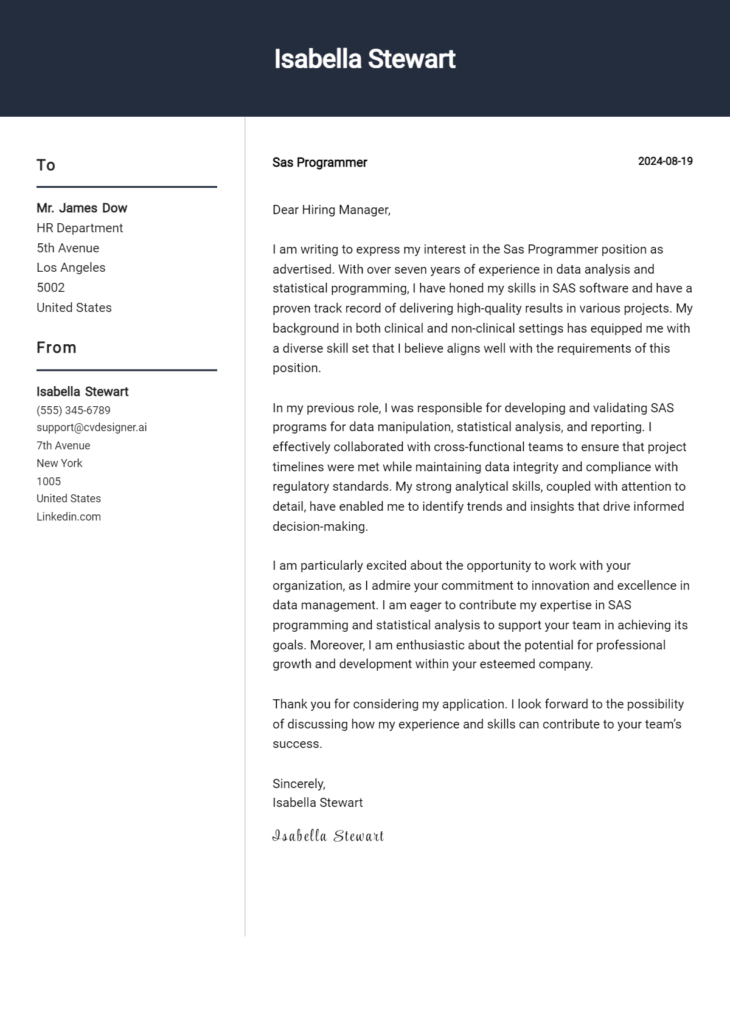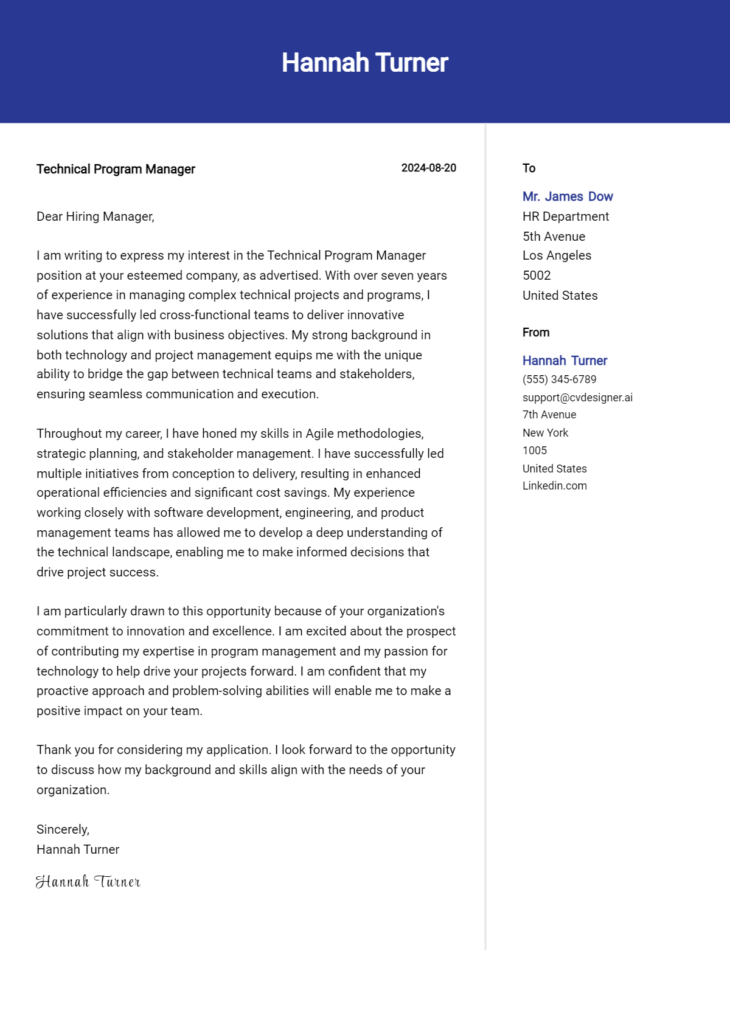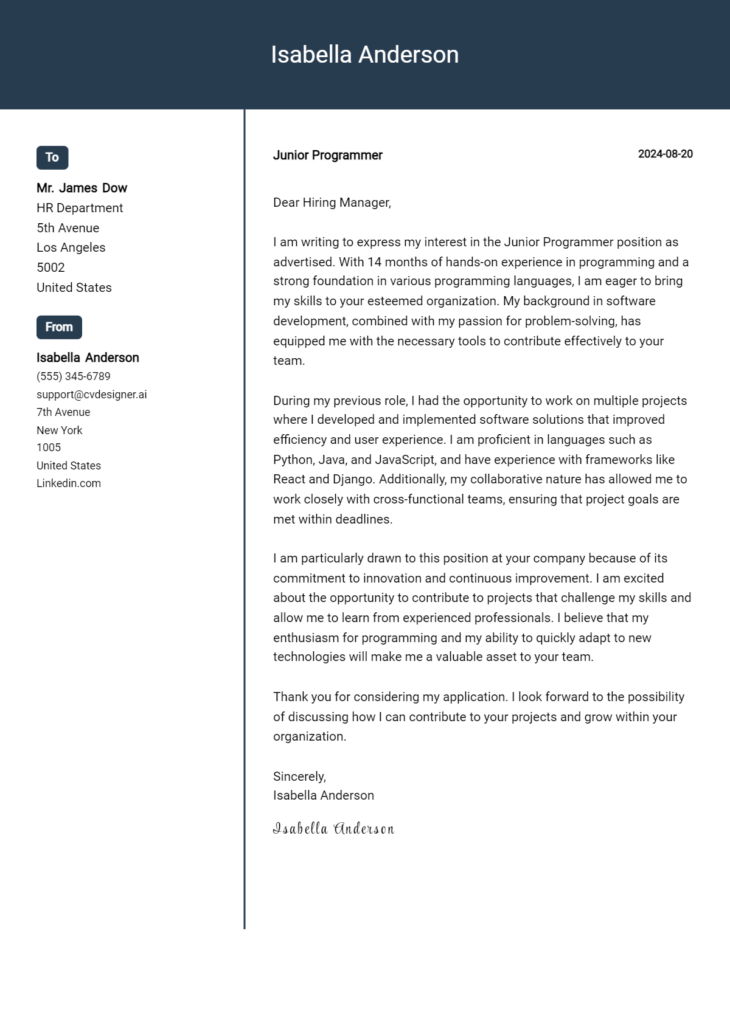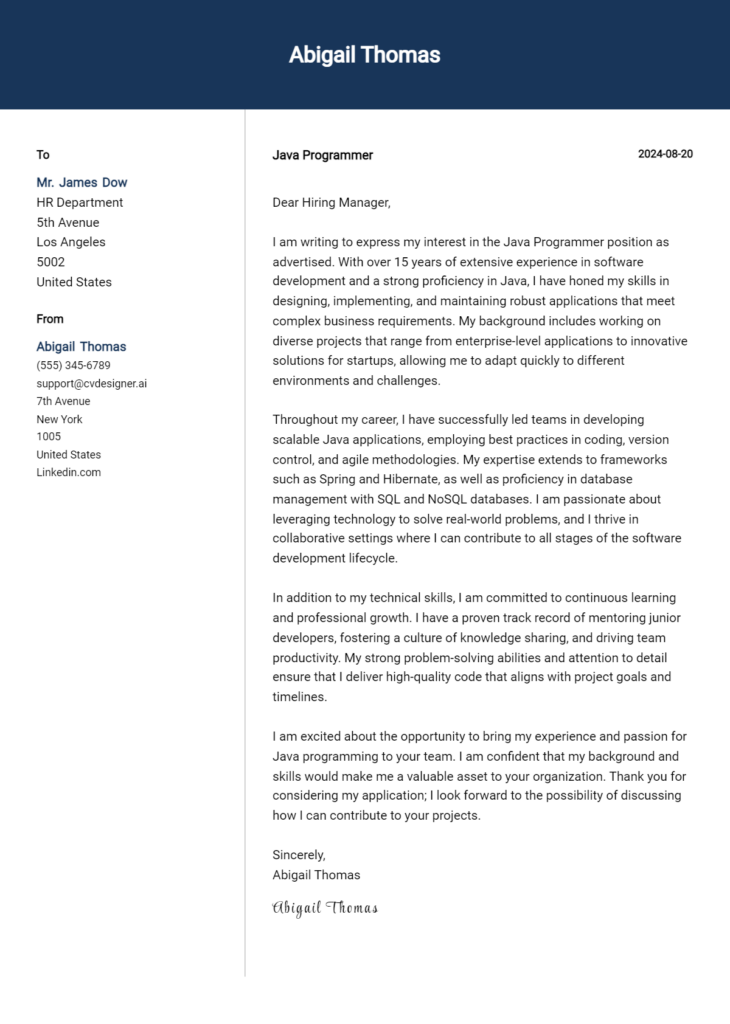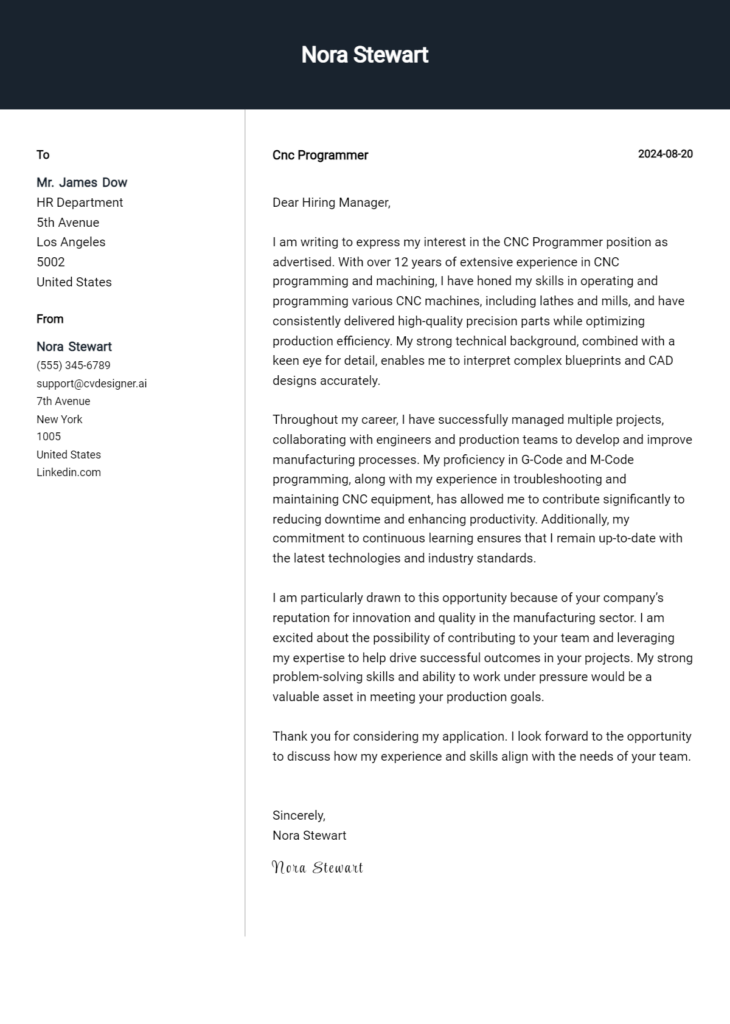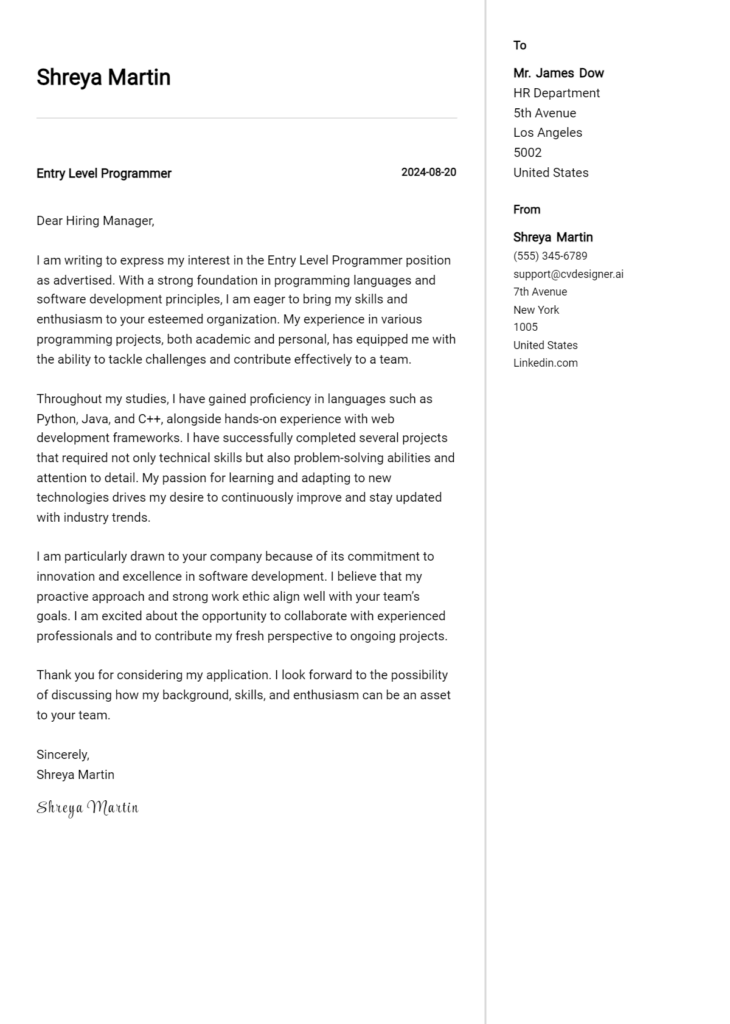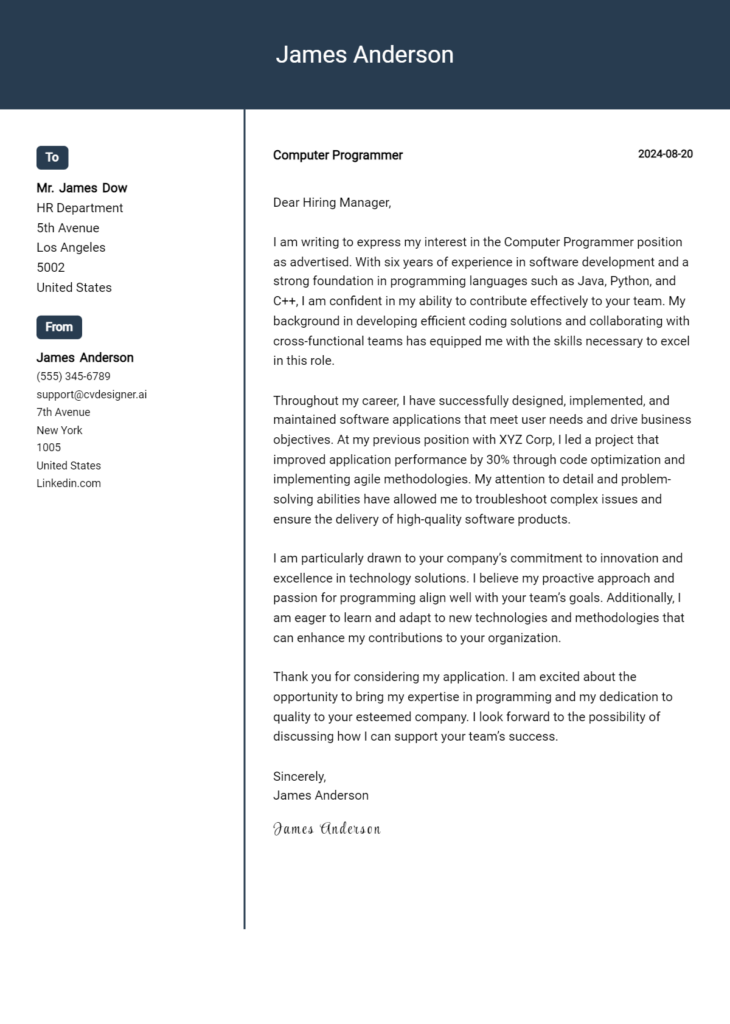Most Popular Programmer Cover Letter Examples
Explore additional Programmer cover letter samples and guides and see what works for your level of experience or role.
As a programmer, crafting a compelling cover letter is a crucial step in showcasing your skills and setting yourself apart in a competitive job market. A well-structured cover letter not only highlights your technical abilities but also demonstrates your passion for coding and problem-solving. In this comprehensive guide, we will delve into the essential elements that make up an effective programmer cover letter, ensuring you leave a lasting impression on potential employers. Here’s what you can expect to learn:
- What does a Programmer Cover Letter accomplish? – Understand the purpose and importance of your cover letter in the hiring process.
- Key Components of a Programmer Cover Letter – Discover the fundamental elements that every cover letter should include to grab attention.
- Format a Programmer Cover Letter – Learn the best practices for formatting your cover letter to enhance readability and professionalism.
- Three different level cover letter examples – Explore tailored examples for entry-level, mid-level, and senior programmers to guide your writing.
- Common Mistakes to Avoid in a Programmer Cover Letter – Identify pitfalls that could undermine your application and how to steer clear of them.
- Key Takeaways – Summarize the critical points to remember when crafting your cover letter.
By the end of this article, you'll have a solid understanding of how to write an effective programmer cover letter that not only showcases your skills but also aligns perfectly with the job you're targeting. Let’s get started on elevating your job application to the next level!
What does a Programmer Cover Letter accomplish?
A cover letter for a Programmer serves as a crucial introduction to potential employers, allowing candidates to showcase their technical skills, relevant experiences, and enthusiasm for the role. It complements the resume by providing context and highlighting specific projects or achievements that align with the job requirements. A well-crafted cover letter not only demonstrates a candidate's understanding of the company and its needs but also allows them to convey their personality and communication skills, which are vital in collaborative environments. For a comprehensive approach to writing an effective cover letter, you can refer to our cover letter guide or utilize our cover letter builder to create a tailored document that stands out among the competition.
Key Components of a Programmer Cover Letter
- Introduction and Purpose: Begin your cover letter with a compelling introduction that states the position you’re applying for and how you found out about the opportunity. This sets the tone and provides context for the reader.
- Relevant Skills and Experience: Highlight your technical skills, programming languages, and relevant experience. Be specific about projects or achievements that showcase your capabilities, such as contributions to open-source projects or successful software implementations.
- Passion for Technology and Problem Solving: Convey your enthusiasm for programming and your approach to solving complex problems. Share examples that illustrate your passion, such as participation in hackathons or personal projects that demonstrate your commitment to continuous learning.
- Closing and Call to Action: Conclude with a strong closing statement that reiterates your interest in the position and invites the employer to contact you for an interview. This is a great opportunity to express your eagerness to discuss how your skills can benefit their team.
For more guidance, you can explore cover letter examples and understand the ideal cover letter format.
How to Format a Programmer Cover Letter
When applying for a programming position, a well-structured cover letter can set you apart from other candidates. It provides an opportunity to showcase your technical skills, relevant experiences, and enthusiasm for the role. Here's how to format your cover letter effectively:
- Personal Addressing: Begin with a personalized greeting, addressing the hiring manager by name if possible. This shows attention to detail and a genuine interest in the position.
- Strong Opening Statement: Start with a compelling opening that captures the reader's attention. Mention the position you’re applying for and express your excitement about the opportunity.
- Brief Introduction: Introduce yourself and summarize your current status (e.g., a recent graduate, an experienced developer) to provide context for your application.
- Highlight Relevant Skills: Identify key programming languages and technologies that are relevant to the job description, and showcase your proficiency in them.
- Showcase Experience: Provide specific examples of past projects or roles that demonstrate your programming skills and problem-solving abilities. Use metrics or outcomes to illustrate your contributions.
- Connect to Company Goals: Research the company’s projects or values and explain how your skills and experiences align with their goals, showing that you’ve done your homework.
- Emphasize Soft Skills: Mention soft skills such as teamwork, communication, and adaptability, which are crucial in collaborative programming environments.
- Express Enthusiasm for Learning: Highlight your willingness to learn new technologies or concepts, showcasing your growth mindset and adaptability in a fast-evolving field.
- Call to Action: Conclude with a strong call to action, expressing your eagerness to discuss your application further in an interview.
- Professional Closing: End with a professional closing statement, thanking the hiring manager for their time and consideration, and sign off with your full name.
Programmer Entry-Level Cover Letter Example #1
I am writing to express my interest in the entry-level Programmer position at [Company Name], as advertised on [where you found the job listing]. With a recent degree in Computer Science from [Your University] and hands-on experience in software development through internships and personal projects, I am excited about the opportunity to contribute to your team.
During my time at [Your University], I developed a solid foundation in programming languages such as Java, Python, and C++. My coursework included projects that required me to design and implement software solutions, which helped me hone my problem-solving skills and attention to detail. One of my significant projects involved creating a web application that allowed users to track their fitness goals. This experience taught me the importance of user experience and the value of writing clean, maintainable code.
Additionally, I completed an internship at [Internship Company Name], where I collaborated with a team of developers on a project aimed at improving the efficiency of an existing software product. I actively participated in code reviews and contributed to debugging efforts, which enhanced my understanding of software development processes and best practices. This experience not only reinforced my technical skills but also instilled in me the importance of teamwork and open communication in achieving project goals.
I am particularly drawn to [Company Name] because of its commitment to innovation and its focus on [specific aspect of the company or its projects that interests you]. I am eager to bring my programming skills and enthusiasm for technology to your team while continuing to grow and learn in a dynamic environment.
Thank you for considering my application. I am looking forward to the possibility of discussing how my background, skills, and enthusiasms align with the goals of [Company Name]. I am excited about the opportunity to contribute to your team and help drive impactful projects forward.
Programmer Mid-Level Cover Letter Example #2
I am writing to express my interest in the Programmer position at [Company Name] as advertised on [where you found the job listing]. With over four years of experience in software development and a strong foundation in various programming languages, I am excited about the opportunity to contribute to your team. My background in developing scalable applications and my commitment to delivering high-quality code align well with the objectives of [Company Name].
In my previous role at [Previous Company Name], I successfully led a team of developers in creating a web-based application that improved user engagement by 30%. I utilized my expertise in JavaScript, Python, and SQL to design and implement features that streamlined processes and enhanced user experience. My efforts in the project not only honed my technical skills but also strengthened my ability to collaborate effectively with cross-functional teams, ensuring that we met project deadlines and exceeded client expectations.
In addition to my technical abilities, I have a strong passion for continuous learning and keeping up with emerging technologies. I recently completed a certification in cloud computing, which has allowed me to apply my knowledge to develop applications that are not only efficient but also leverage cloud infrastructure for scalability. I believe this experience will be beneficial in supporting [Company Name]’s goal of innovating and delivering top-notch solutions to clients.
I am particularly drawn to [Company Name] because of your commitment to [specific company value or project]. I admire your approach to [mention any known project or initiative], and I am eager to contribute my skills to further these initiatives. I am confident that my proactive attitude and problem-solving skills will make a valuable addition to your programming team.
Thank you for considering my application. I look forward to the opportunity to discuss how my background, skills, and enthusiasms align with the goals of [Company Name]. I am excited about the possibility of contributing to your team and am available for an interview at your earliest convenience.
Programmer Experienced Cover Letter Example #3
I am writing to express my interest in the Programmer position at [Company Name], as advertised on [Job Board/Website]. With over [X years] of extensive experience in software development and a proven track record of delivering high-quality, innovative solutions, I am excited about the opportunity to contribute to your team. My expertise spans multiple programming languages, frameworks, and development methodologies, equipping me with the skills necessary to tackle complex challenges and drive project success.
In my previous role at [Previous Company Name], I led a team of developers in the design and implementation of a scalable web application that increased user engagement by over 40%. By utilizing technologies such as JavaScript, Python, and React, I was able to optimize the application’s performance and streamline the user experience. Additionally, my experience with Agile methodologies has enabled me to effectively collaborate with cross-functional teams, ensuring that projects are delivered on time and align with business objectives.
Moreover, I have a strong background in database management, having worked extensively with SQL and NoSQL databases to design efficient data storage solutions. At [Another Previous Company Name], I was responsible for migrating legacy systems to modern platforms, resulting in a 30% reduction in operational costs. My attention to detail and commitment to code quality have been instrumental in maintaining high standards throughout the development lifecycle, including thorough testing and documentation practices.
I am particularly drawn to the innovative projects at [Company Name] and am eager to bring my technical skills and strategic thinking to your team. I am confident that my ability to analyze complex problems and create effective solutions will make a significant contribution to your goals. I look forward to the opportunity to discuss how my background, skills, and enthusiasms align with the vision of [Company Name]. Thank you for considering my application.
Cover Letter Tips for Programmer
When crafting a cover letter as a programmer, it's essential to showcase both your technical skills and your ability to solve problems creatively. Start by personalizing your letter to the specific company and position, reflecting your understanding of their projects and values. Highlight relevant programming languages and technologies you excel in, and give concrete examples of past projects or experiences that demonstrate your abilities. Be concise and clear, avoiding overly technical jargon unless it is directly relevant to the job description. Finally, express enthusiasm for the role and the company, showing that you are not just looking for any job, but are genuinely interested in contributing to their success.
Cover Letter Tips for Programmers:
- Tailor Your Letter: Customize your cover letter for each job application to align with the company's goals and the specific programming skills they seek.
- Showcase Relevant Experience: Highlight specific projects or roles where you utilized programming languages or technologies that are relevant to the job.
- Quantify Your Achievements: Whenever possible, use numbers to demonstrate your impact, such as "improved application performance by 30%" or "reduced load time by 50%."
- Include Soft Skills: While technical skills are crucial, don't forget to mention soft skills like teamwork, communication, and problem-solving.
- Use Clear Language: Avoid excessive jargon; make sure your letter is understandable to both technical and non-technical readers.
- Express Enthusiasm: Convey your passion for programming and interest in the company's projects to show you are genuinely motivated.
- Keep It Concise: Aim for a one-page cover letter that is direct and to the point, ensuring that every sentence adds value.
- Proofread for Errors: Carefully check your letter for grammatical mistakes and typos, as attention to detail is vital in programming.
How to Start a Programmer Cover Letter
As a programmer, your cover letter introduction is crucial in making a strong first impression. It should not only highlight your enthusiasm for the position but also showcase your relevant skills and experiences. Below are some effective examples of cover letter introductions for a programmer.
“I am excited to apply for the Programmer position at [Company Name], as I have a deep passion for coding and a proven track record of delivering innovative software solutions. With over five years of experience in Java and Python development, I am eager to contribute my technical skills to your team.”
“Having recently completed my degree in Computer Science, I am thrilled to apply for the Programmer role at [Company Name]. My academic projects, combined with my internship experience, have equipped me with a strong foundation in software development and a keen interest in building user-friendly applications.”
“I was excited to discover the Programmer position at [Company Name] on [Job Board/Website]. With a solid background in full-stack development and a commitment to continuous learning, I am eager to bring my expertise in modern web technologies to your dynamic team.”
“As a programmer with a passion for problem-solving, I was drawn to the opportunity at [Company Name]. My experience in developing scalable applications and my proficiency in languages such as C# and JavaScript make me a strong candidate for this role.”
“With a background in both software engineering and data analytics, I am excited to apply for the Programmer position at [Company Name]. My experience in designing and optimizing algorithms, coupled with my ability to work collaboratively in teams, will allow me to contribute effectively to your projects.”
How to Close a Programmer Cover Letter
Closing a cover letter effectively is crucial to leaving a lasting impression on potential employers. Here are some examples tailored for a Programmer role that can help you convey enthusiasm and professionalism:
“I am excited about the opportunity to contribute to your team and help drive innovative software solutions. I look forward to discussing how my skills align with your project needs.”
“Thank you for considering my application. I am eager to bring my expertise in coding and problem-solving to your company and am looking forward to the possibility of working together.”
“I appreciate your time and consideration. I am enthusiastic about the chance to collaborate with your talented team and contribute to the exciting projects at [Company Name].”
“I am looking forward to the opportunity to discuss how my background in software development can enhance your team’s capabilities. Thank you for your consideration.”
“Thank you for reviewing my application. I am excited about the possibility of utilizing my programming skills to make a meaningful impact at [Company Name] and hope to speak with you soon.”
Common Mistakes to Avoid in a Programmer Cover Letter
When applying for a programmer position, your cover letter serves as a crucial introduction that can set you apart from other candidates. It’s an opportunity to showcase not only your technical skills but also your passion for programming and your fit for the company culture. However, many applicants make common mistakes that can undermine their chances of landing an interview. Here are some pitfalls to avoid when crafting your cover letter:
- Generic Templates: Using a one-size-fits-all approach can make your cover letter feel impersonal. Tailor your letter to each specific job and company.
- Lack of Specificity: Failing to mention specific programming languages, technologies, or projects can make your skills seem vague. Be precise about your expertise.
- Overly Technical Language: While it's important to demonstrate your technical knowledge, using jargon or overly complex terminology can alienate non-technical readers.
- Ignoring the Job Description: Not addressing the qualifications and skills mentioned in the job listing can show a lack of attention to detail or genuine interest in the position.
- Focusing Too Much on Yourself: While it’s important to showcase your achievements, it’s equally crucial to convey how your skills can benefit the company.
- Neglecting Proofreading: Spelling and grammatical errors can create a negative impression. Always proofread and consider asking someone else to review your letter.
- Lack of Enthusiasm: A cover letter that reads flat or unenthusiastic can fail to engage the reader. Show your passion for programming and the company.
- Long-Winded Explanations: Keep your cover letter concise and to the point. Avoid lengthy paragraphs and focus on clear, impactful statements.
- Forgetting a Call to Action: Not including a closing statement that encourages the reader to take the next step can leave your letter feeling incomplete.
- Not Including Relevant Experience: Omitting key projects or experiences that relate directly to the job can weaken your application. Highlight your most relevant work prominently.
Key Takeaways for a Programmer Cover Letter
Crafting a compelling cover letter is essential for any programmer aiming to stand out in a competitive job market. Your cover letter should not only highlight your technical skills and experiences but also demonstrate your passion for programming and your understanding of the company's mission and values. By personalizing your letter to reflect the specific job description and showcasing relevant projects or achievements, you can effectively capture the hiring manager's attention. Utilizing cover letter templates can help streamline this process, ensuring that your letter is both professional and visually appealing.
Additionally, consider leveraging a cover letter builder to simplify the creation of your cover letter. These tools can guide you through the essential components and help you format your content effectively. Remember, a well-structured cover letter is an opportunity to convey your enthusiasm and fit for the role, so take the time to craft a narrative that resonates with your audience. By combining your technical expertise with a personal touch, you can significantly enhance your chances of securing an interview and advancing your programming career.
